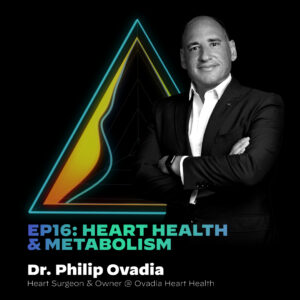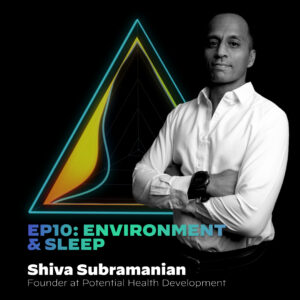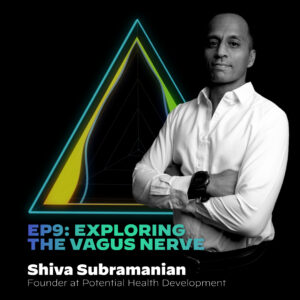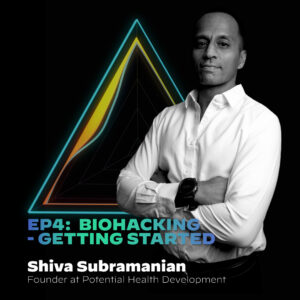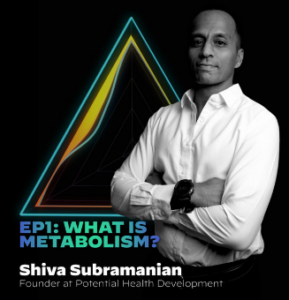Introduction Of Podcast
A good night’s sleep is not only critical for recovery, but it also has a say in your metabolic health. In this episode, Mohit & Shiva unpack how can sleep, or the lack of, can affect your blood glucose. Tune in!
Timestamps
- (0:00 – 0:58) – Introduction
- (01:16 – 08:00) – Ways In Which Glucose Indicates Sleep Performance
- (08:13 – 17:04) – What’s the Role Of Food?
Key Takeaways – Transcripts
Intro (Mohit): So, when we think about health, or when you think about fitness, we think about gyms. When we think about fitness protocols, we think about nutraceuticals. But it’s very uncommon to not associate sleep with health, whereas this is the most common health activity or the most frequent health activity that all of us do. And if you look at it, bad sleep or poor quality of sleep has been linked to almost every type of disorder that you can name, and quite specifically, metabolic disorders. Now, it can affect the level of your insulin sensitivity in your body, but then that also has a bunch of downstream effects around, making you more susceptible to prediabetes or diabetes or any other metabolic disorder. Today, Shiva and I deep dive into how sleep impact metabolic health.
Question (Mohit): So, Shiva. This is interesting. That the fact that when people think about fitness and lifestyle changes that people need to make around fitness or becoming more fit, people often think about things like going to the gym, eating healthy, but then visually, you never think about sleeping more or sleeping better. When you look at it from a glucose perspective, what are some of the ways in which glucose could actually prove to be an indicator of your sleep performance? Or regulating glucose guide you towards better quality sleep? Actually
Answer (Shiva): Mohit that’s a fantastic question because everything to do, the body is bi-directional. So, it’s exactly like you put it right? Glucose affects sleep and sleep will affect glucose the next day. So, you basically approach it from both sides of the spectrum. So, let’s take one scenario first and then let’s consider the other scenario. So, let’s actually go to say what happens if I don’t sleep well? Because a lot of people today, the hectic lifestyle, everything that’s happening, let’s consider that. To begin with, I think it’s got a compounding effect. So, say that you have a Cyborg on and it’s constantly measuring your glucose and you get up in the morning and you haven’t slept well. What you first notice is actually you are off by a couple of points of glucose the next day compared to the days that you actually slept well. What do you mean by the glucose levels will be higher, which means your insulin sensitivity may have been reduced. So, as you know, the glucose basically has to be put into your cells by the insulin. But at the level of the cells, the insulin is not sensitive enough on the receptor level to be able to push the glucose into the cell. And often what that does is leaves the glucose levels in the blood a little higher. And you’re talking about marginally, right? Say every day I have a good night of sleep, my glycolsis is each person is going to vary a little bit. Let’s say 80, 85 maybe. The days that you don’t sleep, it’s going to be at 90, 92. Now, say I don’t sleep the next night. It becomes a trend. You slowly see it creeping up. It becomes a very interesting tool because then it’s actually giving you an idea of how something you can’t see in your body is behaving, right? I mean in this case it will be insulin which you can’t actually see unless you do a blood test and that’s fasting insulin or insulin during the day, but the glucose is inadvertently actually telling you look something is wrong, you’re not as sensitive as you should be or you are when you sleep. Now what are the consequences of this? If this is already going to start your day like this, it means that your cells are not at the most efficient, I suppose, state. What could you do? I suppose the quick fixes that afternoon nap, if you can get that in it will change a little bit. But nothing like a good night of sleep, right? I mean that’s fundamental. Now the other things that you can actually do maybe is to watch what you eat because you’re going to be more sensitive to a carbohydrate load coming in on that day, right? Because say that my insulin is not so sensitive. Maybe if that day I go and have like a high carb breakfast, I’m going to start creating a lot of ups and downs during the course of the day. Maybe it’s a day that we have to stick to more protein and more fiber, knowing that listen, everything is not optimized. So today maybe I should be a little more careful, so I don’t put any extra stress on my body today. So that’s on this side of the spectrum, as a quick brief, on the other side of the spectrum, say that at night I have too much, I’ve eaten too late. One of the things that could actually happen is it could actually keep you up because now your body has to function for a lot longer period to actually engage and basically put that glucose back into the cells. Do you know something amazing? The body actually as you know, works on a whole circadian rhythm, right? Now what’s interesting about the circadian rhythm is the organs, especially for nutrition, beginning to shut their clocks down in the evening. So, they’re not at their optimal state. They’re probably at their optimal state early in the morning. By evening your liver and your stomach, you’re not going to be producing as much acid, right? I suppose even your liver is not going to be able to engage with the food and deal with it with the same efficacy as if you had the same food in the morning. Which is why often if you have a heavy dinner, you find that it’s you’re really uncomfortable or you’re not able to sleep for a long time. Also, a lot of people in the evenings when they have a heavy meal go through stuff like acid reflux and all of those things. So, if you now really think about it. There’s an innate rhythm in every cell, in the body, in every organ, even. So, say I’ve loaded myself. It’s not so much just the what you ate, it’s the when you eat it as well, right? And that’s another thing you can observe on the sidewalk. You can say, I can have the same meal in the morning and it’s high in carbs and somehow my body is able to disseminate it, and then I can do the same thing in the evening. And then you’ll see a very interesting differential, right? But what makes it more interesting is that every move you make during the day helps. So, if you worked out and then you’re going to have a higher carb meal, maybe the muscles sponges a lot of weight in, right? And the liver also has it because you had a heavy workout. But if you haven’t, where is it all going to go? So then it’s out in the bloodstream and then you will have a higher amount of glucose, which means your insulin level is going to be up. You’re going to be more aware, more alert, I suppose more uncomfortable, because what’s going to then happen is that your sleep is not going to hit the cycles that you would like for recovery, because even though you’re asleep, you’re not hitting the optimal sleep because your body is overworking to deal with this, right? So, this is in a case of excess. Let’s take another scenario over here and let’s talk about nocturnal hypoglycemia. There are many reasons for it, lots of diabetic one, but let’s say just for the general person, right? I’ve done a tremendous amount of work out, but I’ve under fueled during the day. When I say under fuel, I just mean, look, the day has kept you too busy, you haven’t actually eaten as well as you should.
Question (Mohit): I’ll also add a practical scenario to this that just with the context that now that a lot of people do intermittent fasting and keto diets, and some people also eat once a day, and there’s nothing wrong with that. But I think probably there is importance or there is a role of food and also putting you to sleep, I think, which is the point that I think you’re going to bring that the other way around. The excess is well understood, but the lack of it. How does that play a role? Not just with the context of hypoglycemia, but also otherwise in the overall equation of sleep quality recovery? Because just like excess, not all excess is bad, not all deficit is good. There has to be some balance here. It seems more complicated than it is. Sort of like Portrait.
Answer (Shiva): 100%. Look, the more information we have on ourselves, the better qualified we are to make better decisions for ourselves. I think that intermittent fasting ketogenic diets have a fantastic application in scenarios, in individual scenarios, right? But whether it works for everyone is what we’re actually discussing and saying that, yes, for some people imagine for some reason I’m not able to access my fats. I may have a biological cofactor issue, for example, because of the amount of stress or because I’m not eating enough vegetables. I don’t have enough of the B vitamins, which are the cofactors on the citric acid cycle, or in your mitochondria, which help you break down fats
Say, for example, we are in this scenario. So, which means that I’m not optimized at fat burning before I’ve gone into an intermittent fast.
Question (Mohit): You need B vitamins to metabolize your fats?
Answer (Shiva): Yes, you need a lot of vitamins not just to metabolize fats, but to metabolize food, right? Because a lot of B vitamins are part of something we call the cofactor, right? There are many minerals in vitamins that are basically the support system to be able to be efficient, right? Everybody always looks at the big stuff. I think the ones that we always hear about over here are vitamin B twelve. I mean, everyone knows about vitamin B twelve, but there are a range of other ones, right? You got another ten or 15 very crucial ones that are a part of that. In fact, if you look at longevity, everybody’s talking about the NAD molecule right now a lot. NAD precursor is niacin, which is Vitamin B three. I’m just giving you some ideas about how those applications can actually come in, right? You see something in your blood often you see homocysteine up. Homocysteine is a common blood marker for inflammation, and it’s not desirable often beyond a certain point. And that can be brought down with a series of different vitamins, like vitamin B six, and then there’s something called five MTHF and there are flavonoids that actually help that. So, if you really think about it and that’s where the Whitman B Twelve comes in as well in these cycles. Now you want all of this to be working in concert, because all of this together, working in concert will actually help you with metabolisation of everything, right? So, here’s my point. If we have all this optimized, obviously even the intermittent fasting is optimized so that you’re getting the biggest bang for your buck. Otherwise, imagine doing a lot of hard work but not reaping the maximum benefits of it, right? Now, I’m not saying you have to take nutraceuticals. I’m saying that you may need to consider having more fiber, having the kind of vegetables that actually have these nutrients in it, and hopefully also having enough fermented food. Because a lot of the vitamin B is actually made in your gut. So, which means a good gut profile is also going to help. So, we make vitamin B. Yeah, it’s made by, I suppose, our microbiome helps a lot with the manufacturer of vitamin B. So, when people have a bad gut issue, you can actually see it, right? Our management of stress is vitamin B. There are many vitamin Bs to begin with, right? So, there’s a whole spectrum of them. Anybody can go and check. If you go on the internet, it gives you the whole spectrum. So instead of getting into that, we just know that it’s really important and there are many ways to test it, right? I mean, you can do blood tests, there are other ways to test it. But this is all about efficiency, right? And efficiency on a cellular level. I’m just saying that because you’re overloaded in so many ways today. So, let’s look at some, right? Let’s say that we are overloaded on lack of sleep. Any stress, even exercise, could be considered a stressor, right? But there is positive stressors and then there is distress as well. But again, all of these add load to our systems, right? Now, unlike the old days, you didn’t get to go and hunt, sleep or gather food, sleep, farm, sleep. We don’t get that. Our day is completely dominated by input, by drive, by need to respond. And all of this, all of it needs these cofactors to help in all the cycling. Sometimes what happens is the balance is swayed to a direction where we are not optimized in that level, which means all our efficiency levels come down. I’ll leave you with one more thought. All our neurotransmitters also have the same core factors. So, you can imagine if you’re highly functioning in a job that has a high amount of mental activity, then you still have to use the same complexes, the minerals and healthy fats, for example. All of it is the same cycle, right? So, coming back to the intermittent fasting and what we’re discussing, you’re absolutely right. How do we optimize all of these elements to be able to get to something where it’s highly efficient? Now, most practitioners who are actually helping people with this are often aware of it. But sometimes today, because of books, I think people get into, like for example, you’ve got Sinclair, who’s written this amazing book on longevity. But lifespan is a book meant for after you’ve stabilized the other systems. It’s the next and the next, right? But if you have a core component of your health system that’s unbalanced, why are we thinking of longevity? First, we have to fix the foundation, fix the basics. Once you fix the basics, get into great living. Great living into longevity, it’s a progression of the self, right? Health span, basically, yeah, health span before lifespan concurrently as well. But it’s about how we visualize it, right? And let’s get all the plumbing sorted out and then build a house, because otherwise what we often will see is that everybody’s doing all the sexy stuff but forget the foundation. Then obviously the efficiency that you could have garnered is much less right. And I suppose that answers that question on the bell curve. And that’s saying that anything too much is bad. There’s a nice balance and it changes for each person, which is why it’s so crucial to have individual data, individual information, while you make suggestions or also while you’re taking decisions, because then you’re taking a decision based on self-observation, the quantified self, so to speak, in this situation. So, say that you have a Cyborg on and you know that you’re reacting to certain food. You can see what you do in the morning, what you do in the evening. And going back to this case, you have this huge dip in the middle of the night, what people call nocturnal hypoglycemia. Why does that happen? It’s basically because you’re not able to generate enough glucose in the evening. So the human body is just phenomenal. And one of the things over there is that while you’re not eating, your liver is actually going through this process of gluconeogenesis to keep your brain fed. And I suppose we have to consider that human beings have so much of fuel, especially glucose, that’s required for the brain and the nervous system, that it shunts this glucose. The system that we have is to shunt this glucose while we sleep for various activities, especially REM, which is much during the early in the morning. You’ll see that trend where the glucose is actually going up in your system because it’s feeding the sleep cycle, which is REM, which you don’t need it in slow-wave sleep because maybe everything is more shut down. You can actually even see tons of that at night. Now, what happens when the glucose falls is that during the day, obviously the fueling has not been too great, or alternatively, you’ve eaten too many carbs and you’re having a crash on the downside. And the body has to balance. And this up and down, up and down.
(Mohit): That’s what I think rebound hyperglycemia exactly. Is potentially, right?
(Shiva): That’s exactly it, yeah. And then you have the rebound hyperglycemia happening. Right? Right. So, I suppose that’s the truth of it. And you have to be able to look at it and say, observe, and say, okay, this worked for me, this didn’t work for me. And a lot of it is play, isn’t it? I mean, the best way to learn is through play, because if you take it too seriously, you’d be stuck without looking at the limits of your exploration. Over here, you can say, okay, on my good days, I’m able to consume more carbs. Why? Because I’m optimized. I have a good night of sleep. There’s a lot of research out there saying that if you have a bad night of sleep, you’re 50% less efficient inputting glucose into your muscle and into the rest of the systems.
(Mohit): Which means basically less insulin sensitive.
(Shiva): Exactly Giving you more chances of, like, visceral fat builds up, maybe fatty liver and other things like high amount of triglycerides, more adiposity, leading to obesity. These disruptions really do seem to make a difference. So I hope that sort of gives you a broad picture?
(Mohit): No, it does. I think the biggest takeaway is the fact that people have to discover their own fuel and their own lifestyle that actually works for the type of fuel that they’re going to use. If your work requires either a lot of cognitive effort, which uses glucose, or a lot of physical effort, I think it’s important to also fuel properly. We have actually seen this with a few of our athletes as well. Now, one of the athletes that I was speaking to the other day actually ended up cutting their carbs as a fuelling strategy for their workouts because the athletes realized that they can actually function really well. They sort of like, get into the gluconeogenesis mode really fast. And the other thing is that they actually felt perfectly fine without consuming any sort of carbs or pre-workout fuel or had a stable medium protein fiber, sort of like meal before the workout and said like, this helps me stabilize my mood during the workout. But whereas we’ve seen a few cases where a few athletes have seen a hypoglycemia event during the workout, and then they ended up fueling slightly better by adding more carbs to pre workout fuelling strategy, it’s actually quite variable, like how much fat adapted we are, how the process of fuel, how much glycogen stores do we have, all these factors added or add up. And it’s important to my biggest takeaway right now is I think that the fact that it always has to be measured in context, no matter how much complex seems, given that physiology is all connected, once you find the balance, like all bad changes compound, good changes also compound. That’s really cool because then once you figure out your balance by trial and experimentation, these small changes can also lead to big results. For most people, fixing the timing of their meals over a span of five years would actually mean way more than actually committing to something that is basically switching their diets completely to something that they don’t like. So, I think that would be an interesting takeaway. When you consider scenarios like whether you’re getting hypoglycemia during your sleep event or whether you’re getting hyperglycemia, it’s important to actually see these things in context and figure out what really works for you.
Outro (Mohit): I hope this discussion will be helpful to you in your metabolic health journey. Let us know your experiences with sleep by tagging us on our social handle @UltrahumanHQ on Twitter and Instagram. Thank you so much and we’ll see you soon.




